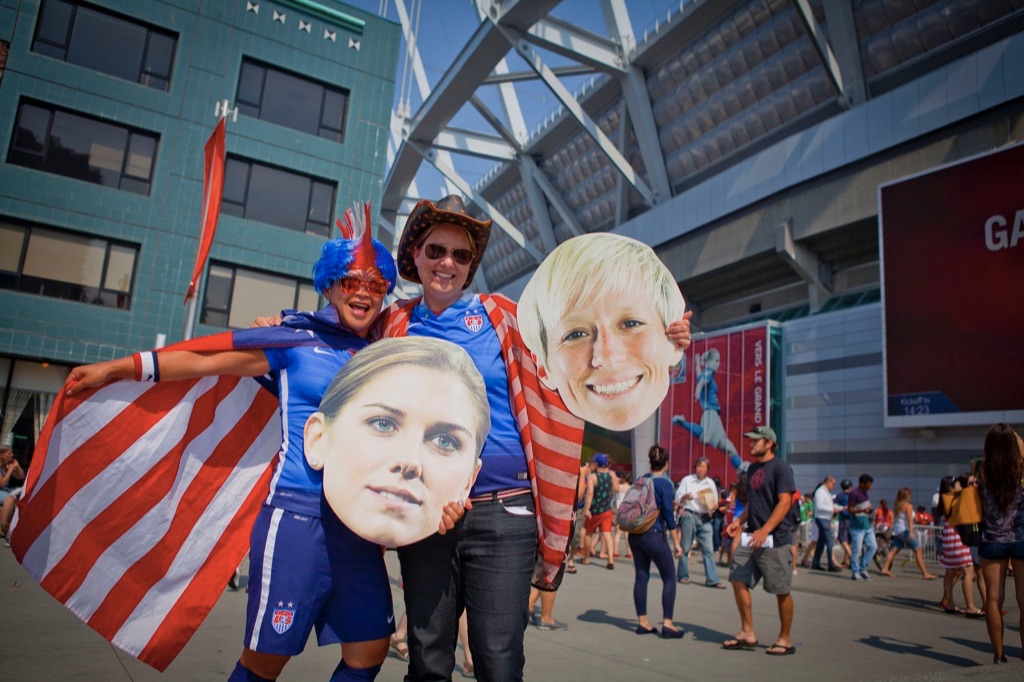After a stunning victory over Japan in the World Cup final, Team USA will return to the United States and the National Women’s Soccer League. Can USA pro soccer take advantage of all the media exposure over the last month?
Women’s pro soccer has a spotted history in the United States, but in this age of television rights and the experiential, the sport should have its best shot at success. The nine-team National Women’s Soccer League (NWSL) is the league positioned to take advantage of #USWNT momentum, and so far there’s been one major development to note: National Women’s Soccer League struck a deal with Fox Sports on a limited broadcast deal for the remainder of the 2015 season.
As part of the deal, FOX Sports 1 will air three regular-season matches and all three games of the NWSL Playoffs, which includes the two semifinal games on September 13 and the NWSL Championship Game on October 1.
In addition, four regular season matches will be available on tablets and mobile devices via the FOX Sports GO app and online at FOXSportsGO.com, beginning Wednesday, July 22.
“We are extremely thrilled to once again partner with FOX Sports to broadcast the National Women’s Soccer League to a national audience,” NWSL Commissioner Jeff Plush said. “FOX Sports’ commitment to soccer, and specifically the women’s game, is fully on display during the 2015 FIFA Women’s World Cup. Their impressive coverage and outstanding viewership during the tournament demonstrates their passion and dedication for the beautiful game.”
“Our agreement with NWSL showcases our continuing support of women’s soccer well after the champion is crowned at the FIFA Women’s World Cup,” said David Nathanson, FOX Sports’ Head of Business Operations. “We are proud to support the sport’s top players through our partnership.”
Indeed, the biggest stars in the World Cup play in the National Women’s Soccer League: Seattle Reign FC goalkeeper Hope Solo, FC Kansas City defender Becky Sauerbrunn, Chicago Red Stars defender Julie Johnston, Washington Spirit defender Ali Krieger, Houston Dash defender Meghan Klingenberg, Houston Dash midfielder Carli Lloyd, Sky Blue FC defender Kelley O’Hara and more.
The rise of the women’s pro sport parallels the men’s: it took a few tries and efforts at the grassroots level to make MLS/NASL/USL what it is today, and those same conditions are in place in the women’s sport. More high-school and college women are playing soccer than ever before, building interest in the sport. That provides potential for interest at the next level, and perhaps some integration with the men’s side of the ledger. It would seem a natural for MLS or NASL teams to add women’s squads, but out of the nine NWSL teams, only two (Houston and Portland) are owned by MLS owners. From the Chicago Tribune:
“We have the top team in the top league in the top sport in the world,” said Arnim Whisler, owner of the Chicago Red Stars professional women’s soccer team, which has four players who are also on the U.S. national team: Shannon Boxx, Lori Chalupny, Julie Johnston and Christen Press. “And because of lack of media, few in Chicago know.”…
The Red Stars are part of the National Women’s Soccer League, the third attempt at getting a professional women’s soccer organization off the ground since 2001. They play at Benedictine University’s 3,000-seat sports complex in Lisle, and their salaries — ranging from $6,000 to $35,000 — are equally modest.
Whisler, the team owner, said the promise of a professional career has partly driven the increase in girls’ participation over the past decade. But he added that a persistent lack of mainstream sports media interest has hindered the league’s development.
That is both true and irrelevant. Soccer in general doesn’t get the media exposure that football and baseball does — that’s true of men’s soccer as well as women’s. But it’s also irrelevant: in this day of social media and direct marketing, MLS has done a wonderful job at creating a grassroots media machine, investing in its own coverage and reaching directly to fans. Building a grassroots media organization is hard work — just ask the MLS officials overseeing its development over the last decade — but it’s an easy excuse to blame the lack of mainstream media coverage. Instead of railing about the lack of coverage in the mainstream media, MLS created its own media machine, to great success.
Image by GoToVan, used via flickr.com under Creative Commons license.

